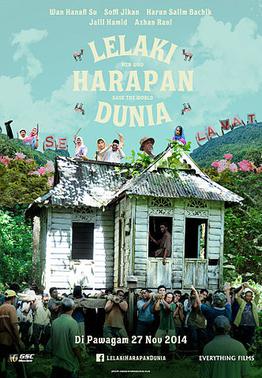Related Research Articles

International Film Festival Rotterdam (IFFR) is an annual film festival held at the end of January in various locations in Rotterdam, the Netherlands, focused on independent and experimental films. The inaugural festival took place in June 1972, led by founder Huub Bals. IFFR also hosts CineMart and BoostNL, for film producers to seek funding.

Ais kacang, literally meaning "bean ice", also commonly known as ABC, meaning "mixed ice"), is a Malaysian dessert which is common in Malaysia, Singapore and Brunei.

The Last Communist is a 2006 Malaysian film described by director Amir Muhammad as a "semi-musical documentary". It is inspired by the leader of the disbanded Malayan Communist Party, Chin Peng and the Malayan Emergency (1948–1960) during which more than 10,000 Malayan and British troops and civilians lost their lives. The film was banned from screening in Malaysia by the government's Home Affairs Ministry.

Kaya toast is a dish consisting of two slices of toast with butter and kaya, commonly served alongside coffee and soft-boiled eggs. The dish was believed to be created by Hainanese immigrants to the Straits Settlements in the 19th century while serving on British ships.
The Network for the Promotion of Asian Cinema (NETPAC) is a worldwide organization of 29 member countries. It was created as the result of a conference on Asian cinema organized by Cinemaya, the Asian Film Quarterly, in New Delhi in 1990 at the instance and with the support of UNESCO, Paris.

Tan Chui Mui is a Malaysian filmmaker, film producer and director.
Amir Muhammad is a Malaysian writer and independent filmmaker.
Liew Seng Tat is a Malaysian filmmaker based in Kuala Lumpur, Malaysia.

Susuk is a 2008 Malaysian Malay-language horror film which was released on 7 August 2008 in Malaysia. The film is directed by Amir Muhammad and Naeim Ghalili. The story concerns Soraya, who uses the forbidden practice of susuk to be famous.
Punggok Rindukan Bulan is a 2008 Malaysian film in the Malay language. It was directed by Azharr Rudin, in his directorial debut feature and produced by Da Huang Pictures. It premiered at the 2008 Pusan International Film Festival. It was shot entirely in the southern city of Johor Bahru, mostly at the low-cost Bukit Chagar flats that have since been demolished to make way for development. The film also screened in several other film festivals such as the 2008 Vancouver International Film Festival, the 2008 Jakarta International Film Festival and 2009 BAFICI It screened in limited release in Malaysia through Golden Screen Cinemas International Screens from 25 September 2008.
The Amber Sexalogy is a 2006 Malaysian compilation of six short films by Azharr Rudin. It premiered at the 2006 Singapore International Film Festival. It was distributed in Malaysia on DVD.
The Big Durian is a 2003 Malaysian film by Amir Muhammad that combined documentary with fiction. It created history by being the first Malaysian film to screen at the Sundance Film Festival.

Apa Khabar Orang Kampung is a 2007 Malaysian documentary by Amir Muhammad. It was produced by Da Huang Pictures. Like its predecessor The Last Communist, it was banned in its home country but screened in several international film festivals. It premiered at the Berlinale in 2006.
Amit Dutta is an Indian experimental filmmaker and writer. He is considered to be one of the most significant contemporary practitioners of experimental cinema, known for his distinctive style of filmmaking rooted in Indian aesthetic theories and personal symbolism resulting in images that are visually rich and acoustically stimulating. His works mostly deal with subjects of art history, ethno-anthropology and cultural inheritance through cinema, many times merging research and documentation with an open imagination.

Vipin Vijay is an Indian film director and screenwriter. He received his post-graduate degree in filmmaking from the Satyajit Ray Film and Television Institute SRFTI, Calcutta. He received the Charles Wallace Arts Award for research at the British Film Institute, London, 2003. Vipin is the recipient of "The Sanskriti Award" (2007) for social & cultural achievement. His works are made under independent codes and defy any categorisation eluding all traditional genre definitions and merge experimental film, documentary, essay, fiction all into one.

Men Who Save the World is a 2014 Malaysian Malay-language comedy film written and directed by Liew Seng Tat. The film was nominated for multiple awards in international film festivals, and won several awards at the 27th Malaysian Film Festival, including Best Picture.
Woo Ming Jin is a Malaysian film director, writer and producer. His films have screened in film festivals such as Cannes, Berlin and Venice. He is also the co-founder of Greenlight Pictures, a film and television production house based in Kuala Lumpur.

Ryusuke Hamaguchi is a Japanese film director and screenwriter. An alumnus of the University of Tokyo and the Tokyo National University of Fine Arts and Music, he started gaining attention in his home country with the graduate film Passion (2008).
Bigyna Dahal is a sound designer and location sound recordist from Sikkim, India who has worked on several Indian films. His films have been screened and won awards at several international film festivals including Busan International Film Festival, Pingyao International Film Festival in China,MAMI Mumbai Film Festival. He has also won best sound design awards at many festivals including Filmfare Award for Best Sound – Marathi and Filmfare OTT Awards.
References
- ↑ Stone, Rob; Cooke, Paul; Dennison, Stephanie; Marlow-Mann, Alex (27 September 2017). The Routledge Companion to World Cinema. Routledge. ISBN 978-1-317-42058-3.
- ↑ "Amir Muhammad's latest film restricted"
- ↑ "Film". Punto de Vista festival. Retrieved 2 January 2024.
- ↑ "YIDFF: Publications: YIDFF 2013 Official Catalog". www.yidff.jp. Retrieved 2 January 2024.
- ↑ Malaysian Gods (2009) | MUBI , retrieved 2 January 2024
- 1 2 ""Malaysian Gods", Amir Muhammad". Centre Pompidou. Retrieved 2 January 2024.
- ↑ Encendida, La Casa. "La Casa Encendida". La Casa Encendida (in Spanish). Retrieved 2 January 2024.
- ↑ "Malaysian Gods | IFFR". iffr.com. Retrieved 2 January 2024.
- ↑ "Malaysian Gods". TVGuide.com. Retrieved 2 January 2024.
- ↑ Planet, Lonely; Albiston, Isabel; Atkinson, Brett; Benchwick, Greg; Bonetto, Cristian; Bush, Austin; Kelly, Robert; Richmond, Simon; Waters, Richard (1 August 2016). Lonely Planet Malaysia Singapore & Brunei. Lonely Planet. ISBN 978-1-76034-162-6.
- ↑ "- Audio". Centre Pompidou. Retrieved 2 January 2024.